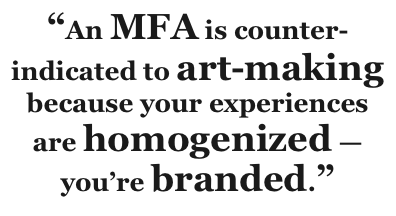
SS: I applied to this program at City College and I got in. The first day I went and the teacher was Grace Paley. I was working on a piece, which later became my third novel After Delores, and we were going around the table reading our work. My work was a first-person lesbian narrative and the other students thought the narrator was a man. I thought “This is going to be two years of hell.” After class, she called me into her office and she said, “You’re really a writer, you’re really doing it. You don’t need this class; go home.” She was working there because she needed to pay her rent; she wasn’t invested in the system and she recognized that it would destroy me. Grace Paley certainly didn’t have an MFA. She saved my life.
AR: What is it in particular about MFAs that you think will destroy a writer?
SS: The whole process is a homogenizing process. The way you become an artist is you make art, you look at art, you talk about art with other artists and you accrue influences eclectically. You start to develop an aesthetic. An MFA is counter-indicated to art making because your experiences are homogenized — you’re branded. It’s like being in the Jets or the Sharks and that’s not what art is.